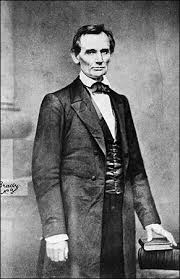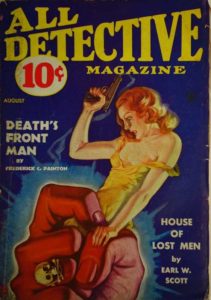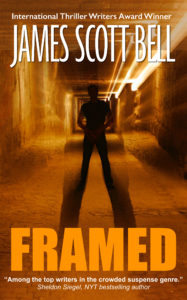by James Scott Bell
@jamesscottbell
 During Abraham Lincoln’s law-practice days, he had occasion to share a stagecoach with his soon-to-be adversary, Stephen A. Douglas, and a man named Owen Lovejoy. They were on their way to the courthouse at Bloomington, Illinois.
During Abraham Lincoln’s law-practice days, he had occasion to share a stagecoach with his soon-to-be adversary, Stephen A. Douglas, and a man named Owen Lovejoy. They were on their way to the courthouse at Bloomington, Illinois.
Douglas, known as “The Little Giant,” was about five feet tall with a long body and short legs. Lovejoy, on the other hand, had a short body and long legs. Lincoln, of course, was 6’4”. It must have been crowded in that coach.
At one point, Douglas tossed some shade at Lovejoy, remarking on his “pot belly” and long legs. Lovejoy came back with a barb about Douglas’s vertically-challenged sticks.
Then Lovejoy looked at the future president and asked, “Abe, just how long do you think a man’s legs should be in proportion to his body?”
Lincoln replied, “I have not given the matter much consideration, but on first blush, I should judge they ought to be long enough to reach from his body to the ground.”
And how long should a story be? Long enough to reach the end, and no longer. (Please note, I have not run this theory by George R. R. Martin.)
Which is why I love the novella form. In a brisk 20k-50k, you can grab a reader and deliver a wallop. Did you know that The Postman Always Rings Twice by James M. Cain is only about 35k words? Hemingway’s The Old Man and the Sea has a similar count.
Stephen King has done some of his best work in novellas (e.g., The Body and Rita Hayworth and the Shawshank Redemption)
 The novella really matured during the golden age of the pulp magazines. In the classic years of the pulps, roughly 1920 – 1955, America was awash in inexpensive commercial fiction of all types. These were printed on cheap wood-pulp paper, bound between wonderfully lurid covers. You could buy one of these magazines for a dime or 15¢, and inside you’d have a plethora of short stories and novellas and perhaps even an entire novel (or an episode from a novel in serialization).
The novella really matured during the golden age of the pulp magazines. In the classic years of the pulps, roughly 1920 – 1955, America was awash in inexpensive commercial fiction of all types. These were printed on cheap wood-pulp paper, bound between wonderfully lurid covers. You could buy one of these magazines for a dime or 15¢, and inside you’d have a plethora of short stories and novellas and perhaps even an entire novel (or an episode from a novel in serialization).
A productive pulpster who could deliver the goods could make a living, even at a penny a word.
The novella largely disappeared after the death of the pulps. It was a difficult sell for book publishers who had to price them to make a profit, while bookstore browsers thought they might not be getting enough story for the price.
That didn’t mean the occasional novella didn’t break out (***cough***The Bridges of Madison County***cough***). But by the 2000s there were few being published simply because production costs exceeded revenue.
Now, because of the digital universe, those costs have disappeared, which has brought a revival of novella-length fiction.
Like the one I’ve just published.
 Here’s how Framed came about. A couple of years ago I was playing the first-line-game. That’s a creativity exercise where you just come up with great opening lines and see if any of them spark a story idea. I’ve got a whole file full of ’em, some of which have led to published work.
Here’s how Framed came about. A couple of years ago I was playing the first-line-game. That’s a creativity exercise where you just come up with great opening lines and see if any of them spark a story idea. I’ve got a whole file full of ’em, some of which have led to published work.
This particular morning I found myself writing It’s not every day you bleed to death.
I had no idea who my character was or how he or she got into the implied predicament.
So I started to play with it. How could this have happened? Was it a suicide or attempted murder? Did my character have a near-death experience? Could he be narrating from the beyond?
I kept asking myself what if questions and writing things down, and eventually came up with an explanation that I liked. And from there I proceeded to develop the story.
I set it aside for awhile as I worked on other projects, then late last year came back to it and finished it. And you know how I knew it was done?
Because its legs had reached the ground. The ending felt just right.
So now, in the spirit of the pulps, I am launching the ebook for just 99¢ on Kindle. I want you to have it. I believe there is a huge market for brisk, suspenseful fiction, just like there was in the 1930s and 40s.
Do you agree?

Probably it’s because I have a short attention span, but i prefer reading and writing shorter works, good to know successful authors like you are still writing them. I just bought Framed & look forward to reading it in one or two reading sessions.
Thanks, Truant. I think attention span is a challenge across the board these days. Which is why short form has made such a comeback.
Jim, Just ordered this latest novella, and look forward to stealing… er, reading how that first line worked out. Seriously, thanks for all you do.
Thanks, Doc. I hope you enjoy the hospital scenes!
Hi Jim,
Picked up your new novella–looking forward to reading it!
I’m a fan of shorter, briskly-paced fiction, too. My favorite Stephen King fictions are novella length, too.
I think there’s definitely a market, both for novellas and for shorter, 50-60K word novels. Thrillers seem ideal for novella length, obviously fewer plot twists, but plenty of suspense.
I’m curious, in terms of mystery novellas, do you see the mystery at the heart of them as less complex (as opposed to the solving of said simply taking less time)? I’m asking for a friend 😉
Hi Dale. Good question, and I think generally yes, it will be “simpler” because the longer the piece, the more “complications” can be thrown in. If you do too much of that in a novella, the result will be confusing.
Picked up my copy last night. While I prefer a good full length novel, I’ve become more open to shorter length work especially with time constraints.
BK, I think a lot of readers are getting that openness now. It’s a nice variance from long form, so it is there if that’s how one feels.
Good morning, Jim.
I just bought FRAMED, and look forward to reading it.
I agree that there is a market for shorter fiction. I’m finishing a middle grade fantasy that will be a 50k – 60k short novel. But it is structured more like a novella.
When you take the next step and reintroduce the physical pulp magazine, say ? BELL’S BEACON FOR PULP PROSE, I’m sure many of us here at TKZ have some short stories we would love to submit.
Good luck with your new book. And let us know when you’re ready for submissions to your new magazine.
Steve, I wish print were such that we could fill grocery and drug stores with a pulp fiction section again!
There are some outposts doing digital pulp. But it’s perfect for DIY.
I just purchased it. I’m sure it will be good. I love the shorter forms and find it hard to commit to anything longer than 300 pages these days. I’m going through John D. MacDonald’s Travis McGee series. Most of those are below the 300 mark (so far), and Lawrence Block’s earlier rough stuff is great, too.
John D. and LB are two great models. Also Richard Stark (aka Donald Westlake) and the Parker novels.
Excellent. (Sorry to sound so–well, you know.)
Do you have a suggestion as to a book on novella writing? Have you written one? If no, will you please write one?
Thank you.
Jim, check out this post:
http://killzoneblog.com/2012/08/how-to-write-novella.html
Great cover. Loved the opening. Guess I’m going to buy the book and find out what happens!
Thank you for the compliment on the cover, Joanne. I designed it myself, which is not something I usually do.
And thanks for letting me know that the first line worked as it is supposed to!
When I said I like the opening, I meant the whole opening section (including the first line). It was all good!
like = liked
I do agree. And I admit to not reading the last pages of novels when they go on past ground-level.
Do you have any advice for finding a publisher for novella-sized fiction? I’ve had several flash-fiction pieces published in magazines and would like to try something longer.
Thank you for any advice you have to give! Also, will you be at ACFW this year? I’m planning to go. It will be my first major conference.
Jenny, as I indicated in the post, I just don’t think novella length is cost-effective for publishers, unless your last name happens to be Patterson!
Why not self publish?
I bought Framed yesterday when I received your newsletter. I look forward to reading it as well. I like all lengths of fiction but the novella intrigues me most right now. Is it only the word count that differentiates the short story, novella, novelette, and the novel, or do other factors define them? Thanks so much for all of your help.
Rebecca, it’s all about word count. Novellas range between 20K and 50K. How you feel that space is up to you. But it needs to be a tightly contained plot for only one or two main characters.
Rebecca, Most of the “novel” lengths in the USA were established by “big publishing” which didn’t even start until the late ’40s, early ’50s. They had to hit certain folio lengths. In many parts of the world, 25,000 words is a novel, and 15,000 to 24,999 is a novella. I have my own set of fiction-length guidelines, though I use them more for pricing than fret over the labels.
Just bought it. (Hoping it doesn’t smear the Christian cult gratuitously, though I know it’s hard not to drink the Kool Aid on the Left Coast.)
Have no fear, Tom.
I once bought an anthology of sci-fi and fantasy novellas and they were pretty good. I don’t consider novellas to be half-done books like some people do; they’re an efficient and fun compromise!
The good ones really can stand, ahem, on their own two legs.
Sorry I’m so late, Jim! Love the first line that prompted your novella.
Thanks, Sue. I just realized that my next stand alone thriller, now in edits, came about the same way!
Pingback: Top Picks Thursday! For writers & readers 03-15-2018 | The Author Chronicles
Sorry this is so late. I’m catching up on my emails again. I think it makes perfect sense novellas are becoming popular again. People have less time to sit down and read long novels and, as you say, getting a book into print is different and easier these days. I have your book FRAMED and look forward to reading it. I recently read a Gutenberg ebook of THE TIME MACHINE and was surprised it was so short. —- Suzanne